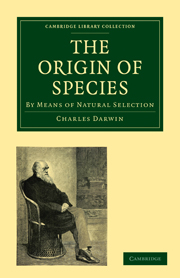 The Origin of Species
The Origin of Species Published online by Cambridge University Press: 29 August 2010
I will devote this chapter to the consideration of various miscellaneous objections which have been advanced against my views, as some of the previous discussions may thus be made clearer; but it would be useless to discuss all of them, as many have been made by writers who have not taken the trouble to understand the subject. Thus a distinguished German naturalist has asserted that the weakest part of my theory is, that I consider all organic beings as imperfect: what I have really said is, that all are not as perfect as they might have been in relation to their conditions; and this is shown to be the case by so many native forms in many quarters of the world having yielded their places to intruding foreigners. Nor can organic beings, even if they were at any one time perfectly adapted to their conditions of life, have remained so, when their conditions changed, unless they themselves likewise changed; and no one will dispute that the physical conditions of each country, as well as the numbers and kinds of its inhabitants, have undergone many mutations.
A critic has lately insisted, with some parade of mathematical accuracy, that longevity is a great advantage to all species, so that he who believes in natural selection “must arrange his genealogical tree” in such a manner that all the descendants have longer lives than their progenitors!
To save this book to your Kindle, first ensure no-reply@cambridge.org is added to your Approved Personal Document E-mail List under your Personal Document Settings on the Manage Your Content and Devices page of your Amazon account. Then enter the ‘name’ part of your Kindle email address below. Find out more about saving to your Kindle.
Note you can select to save to either the @free.kindle.com or @kindle.com variations. ‘@free.kindle.com’ emails are free but can only be saved to your device when it is connected to wi-fi. ‘@kindle.com’ emails can be delivered even when you are not connected to wi-fi, but note that service fees apply.
Find out more about the Kindle Personal Document Service.
To save content items to your account, please confirm that you agree to abide by our usage policies. If this is the first time you use this feature, you will be asked to authorise Cambridge Core to connect with your account. Find out more about saving content to Dropbox.
To save content items to your account, please confirm that you agree to abide by our usage policies. If this is the first time you use this feature, you will be asked to authorise Cambridge Core to connect with your account. Find out more about saving content to Google Drive.